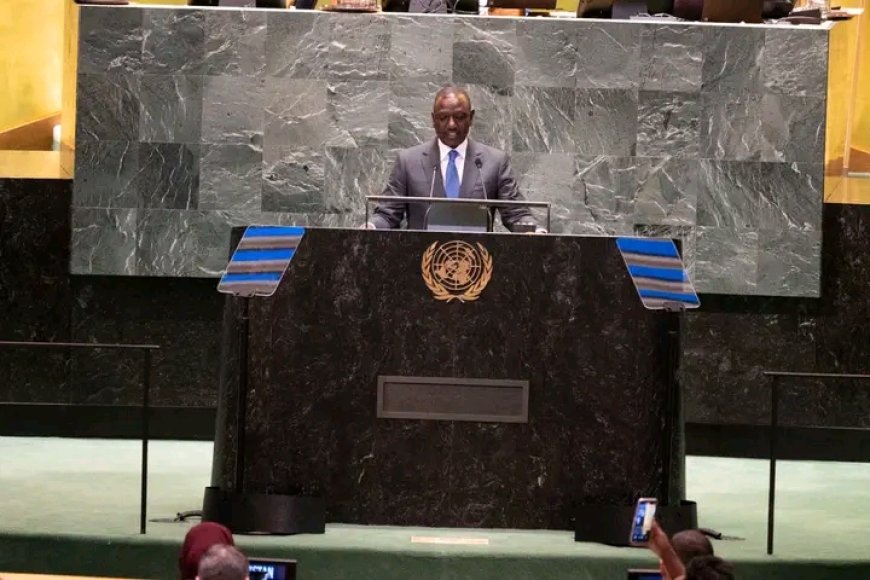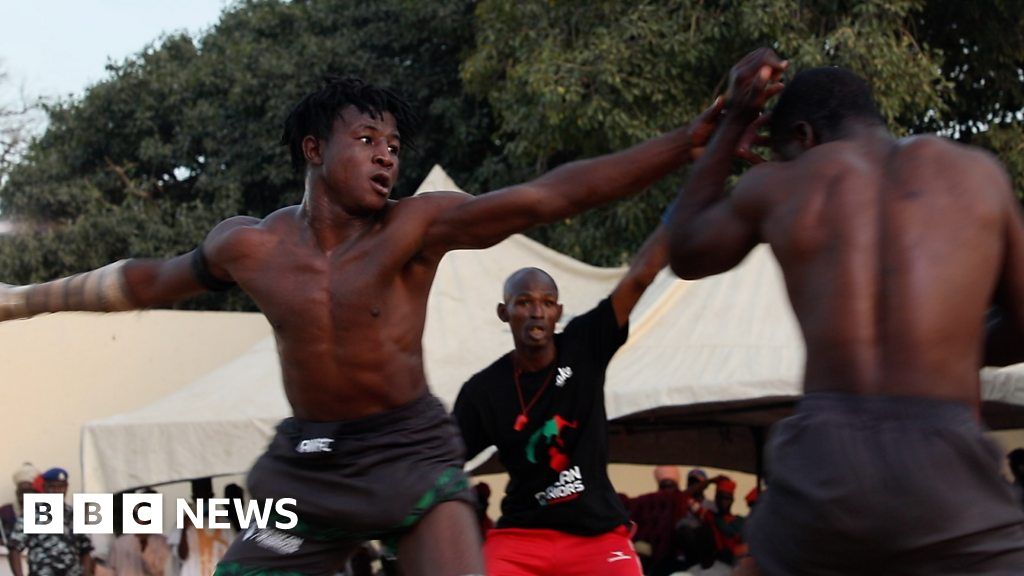Explained!: Why Africa's 'big bold' move to join the UNSC is transformative and just

Nairobi,
Tuesday, 24 September, 2024
McCreadie Andias
The argument for Africa to have two permanent seats at the United Nations Security Council (UNSC) is rooted in principles of fairness, representation, historical context, and global geopolitical dynamics.
The continent's need for greater representation is backed by several key factors that relate to its population, political interests, historical injustices, and its growing importance in global affairs.
The Security Council has 15 members, five of which have permanent seats with veto power: the United States, Russia, China, Britain and France.
The other 10 members of the Council rotate every two years.They include three seats for African states; two each for Asia-Pacific, Latin America and the Caribbean, and Western Europe and other states; and one for Eastern Europe.
Adding any new permanent members would require the approval of all five permanent members and changing the U.N. charter, a dim prospect given the divisions among the permanent members.
Adding only African countries as permanent members would most likely get pushback from other countries, including Japan, Brazil, India, Germany and Italy. For years, those nations have also lobbied for seats, arguing that the world had evolved since the aftermath of World War II when the world body was founded.
Why Africa's Bid to join the UN’s ‘Big boys club’ is necessary
Africa is home to approximately 1.4 billion people, making up about 17% of the world's population. Despite this, the continent has no permanent representation on the Security Council. Permanent membership would better align with its demographic weight.
Meanwhile , Africa consists of 54 countries, which is the largest regional grouping in the United Nations. Its geopolitical significance in terms of natural resources, economic growth, peacekeeping contributions, and the continent's potential for future development cannot be ignored. The lack of permanent representation underrepresents Africa’s role in global governance.
The move will also be an act of rectifying Historical Injustices like Colonial Legacy inflicted upto the continent. Africa has historically been marginalized in global governance, largely due to the effects of colonization. Many African nations only gained independence in the mid-20th century, at a time when the structure of the UN and its Security Council had already been established. Permanent seats would help correct the historical exclusion of Africa from key international decision-making bodies.
Furthermore, Many African nations suffered as proxies during the Cold War, and were subject to various external interventions. The current structure of the UNSC, dominated by Western powers and other major countries, reflects a post-World War II era that no longer reflects modern global realities. Giving Africa two seats would help redress this imbalance and give the continent a say in decisions that affect its peace and security.
A reformed UNSC that includes African representation would enhance the Council's legitimacy. Currently, only five countries—China, France, Russia, the United Kingdom, and the United States—have permanent seats with veto power. This arrangement is often criticized for being outdated, undemocratic, and unrepresentative of today’s multipolar world, with Africa on board, the UNSC will be viewed as inclusive and fair.
Including African nations to UNSC, would also bring valuable perspectives on issues like conflict resolution, poverty reduction, environmental sustainability, and peacekeeping. Africa has extensive experience in peacebuilding, and its inclusion would improve the UNSC's ability to address global challenges, particularly those affecting developing countries.
Africa is becoming an increasingly important player in the global economy. The continent's economies have grown substantially in recent decades, and African markets are crucial for global trade. Africa is also a key source of natural resources such as minerals, oil, and gas. As global competition for resources and markets intensifies, Africa's voice on the international stage should reflect its growing economic stature.
In terms of international peace keeping, African nations contribute a significant proportion of the UN’s peacekeeping forces, yet they have limited influence over the decisions made about where and how peacekeeping missions are deployed. Permanent seats on the UNSC would ensure that African voices are central to decisions impacting peace and security on the continent and beyond.
Similarly, Many of the conflicts addressed by the UNSC are in Africa (e.g., Sudan, Somalia, the Democratic Republic of Congo, and Mali). Despite this, African countries have little direct influence over the resolutions and actions taken by the Council. Permanent representation would give African nations a platform to advocate for solutions that reflect the continent's unique geopolitical context.
Africa has been grappling with the rise of terrorism and violent extremist groups in regions like the Sahel, Nigeria (Boko Haram), and East Africa (Al-Shabaab). A permanent African presence on the Security Council would help ensure that the global response to these threats includes African-led solutions and perspectives, which are crucial for sustainable peace and security.
The African Union has repeatedly called for reforms of the UNSC, reflecting the continent's desire for permanent seats. The AU’s "Ezulwini Consensus" advocates for two permanent seats for Africa with full veto powers, as well as five non-permanent seats. The AU's position emphasizes Africa's demand for a more balanced and equitable international system.
Permanent seats on the UNSC would also strengthen the AU's standing in global governance. It would solidify Africa’s role as a cohesive block capable of influencing global decisions on peace, security, climate change, development, and trade.
With the Global Power Shift and Multipolarity there has been a steady decline of Traditional Powers. The post-World War II global order that saw dominance by a few Western powers is gradually giving way to a more multipolar world. Emerging economies such as India, Brazil, and others are playing an increasingly prominent role. Africa, too, as a large and diverse continent, should be part of this shift toward a more inclusive global governance system.
Not forgetting to mention, China’s economic and political footprint in Africa has grown significantly over the past two decades. With Africa becoming a strategic arena for great power competition, it is essential that African nations have their own say in shaping policies at the highest levels of international diplomacy, rather than being seen as mere pawns in the global power game.
Significance of Two Permanent African Seats on the UNSC
Permanent African seats would not only benefit Africa but would also strengthen the voice of the Global South in global governance. Africa's unique challenges, along with its aspirations for sustainable development, peace, and security, would be more accurately reflected in the Security Council’s decisions.
Additionally, the inclusion of African nations would shift the balance of power within the UNSC, reducing the dominance of the Western bloc and bringing a more diverse range of perspectives to the table. It could also serve as a check on the often unilateral use of the veto by existing permanent members, fostering more multilateral and collaborative decision-making.
With African nations holding permanent seats, there would likely be a stronger focus on addressing the root causes of conflicts in the region, including underdevelopment, political instability, and poor governance. Permanent African members could lead initiatives tailored to African realities and engage with global partners in a more equitable manner.
Which bigger players are backing Africa's Bid?
The United Nations chief has called for the UN Security Council (UNSC) to reform its outdated structure and assign Africa a permanent seat at the table, stressing that the continent is underrepresented.
Addressing the council on Monday during a high-level debate, Secretary-General Antonio Guterres said the composition of the UNSC has failed to keep pace with a changing world.
“We cannot accept that the world’s preeminent peace and security body lacks a permanent voice for a continent of well over a billion people … nor can we accept that Africa’s views are undervalued on questions of peace and security, both on the continent and around the world,” he said.
In May, the UNSC called for the role of African countries to be strengthened in addressing global security and development challenges.
UN General Assembly President Dennis Francis said at the debate that the UN must reflect the world as it is.
“The fact that Africa continues to be manifestly underrepresented on the Security Council is simply wrong, offending as it does both the principles of equity and inclusion,” he said.
“The African Union will choose the African permanent members. Africa wants the veto abolished. However, if UN member states wish to retain the veto, it must be extended to all new permanent members as a matter of justice,” he said.
Similarly,other bigger fish like the United States, Russia and China, have backed Africa’s U.N. Security Council Bid, With a Catch.
Linda Thomas-Greenfield, the American ambassador to the United Nations, unveiled America's support to Africa on Thursday, citing that current non-permanent seats don’t allow Africa's full influence. But the path to making that promise a reality is complicated since it requires more than White House’s approval.
While Washington supports the additional seats, it opposes veto power for the new African members, viewing it as a factor that hinders Council functionality. The expansion reflects ongoing global calls to reform the Security Council, unchanged since 1945.
Still, Ms. Thomas-Greenfield’s announcement could be viewed as a geopolitical gesture toward repairing U.S. relations with Africa, which have been frayed by the conflicts in Ukraine and the Gaza Strip, and toward matching Chinese and Russian influence there. The two U.S. rivals, which have been keen on expanding their influence on the continent, have already backed permanent seats for Africa on the Security Council.
Ultimately, whether Africa gets a permanent stint in the UNSC or not is up to the Security Council itself through a vote. Article 27 of the UNSC provides that decisions of the Security Council are made by an affirmative vote of nine members, whereas each member has one vote.
What's Your Reaction?



































































































































































































































































































